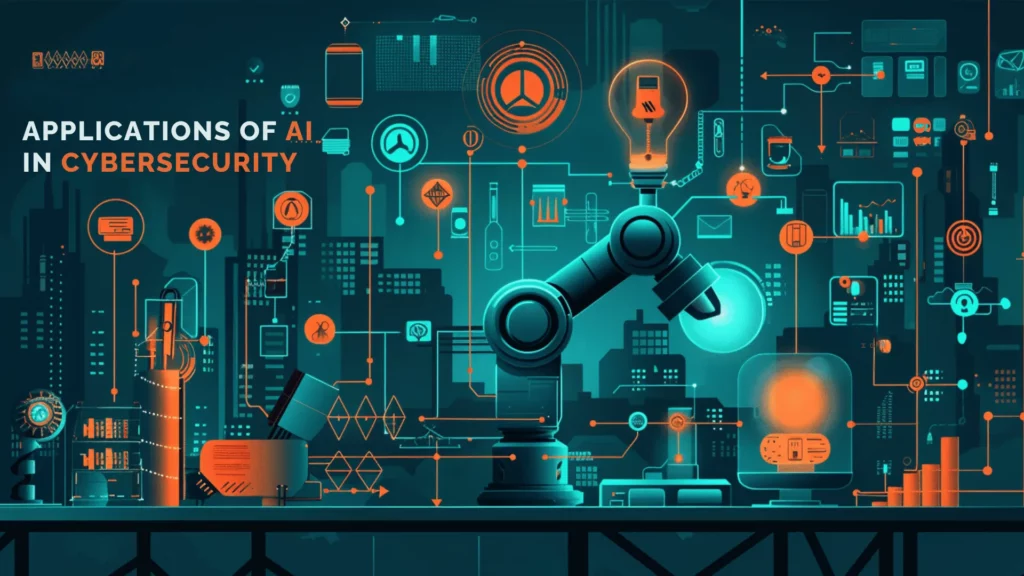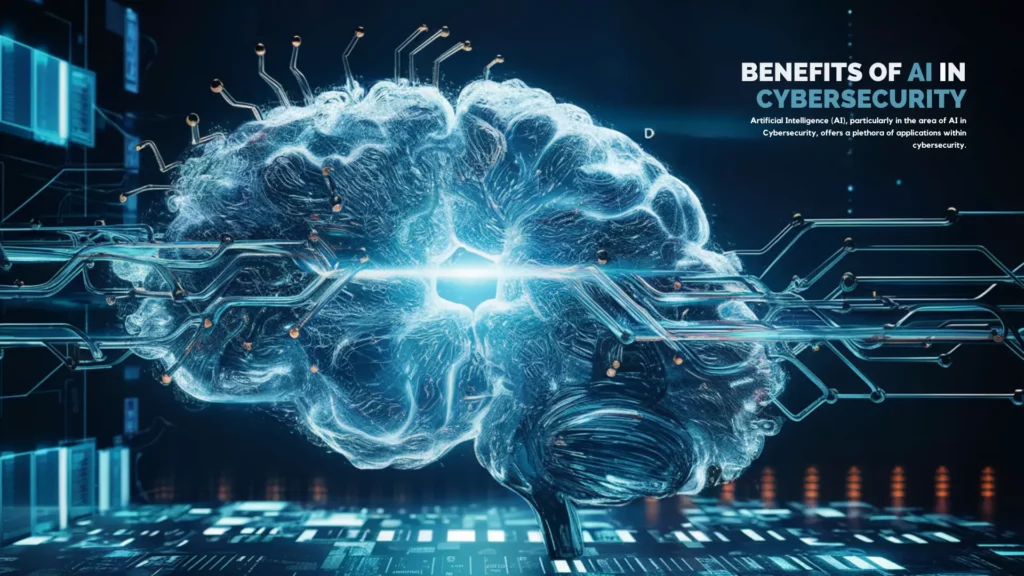AI-Powered Cybersecurity: Evolution of AI in Cybersecurity for 2024 & beyond

With the continuous evolution of technology, the field of cybersecurity, particularly AI in Cybersecurity, has been dramatically impacted by the integration of artificial intelligence (AI). AI has revolutionized how cybersecurity professionals combat cyber threats and protect sensitive data. By harnessing the power of AI systems, organizations can detect and prioritize potential vulnerabilities, breaches, and cyber attacks more efficiently and effectively.
Our audience supports Ahcrypto. When you click on the links on our site, we may earn an affiliate commission at no extra cost to you. Learn More.
Key Takeaways
History of AI in Cybersecurity
The history of AI in cybersecurity dates back to the early days of its integration into security operations. Initially, AI was used to detect and respond to primary cyber threats. However, with advancements in AI technology, particularly in machine learning and neural networks, AI models have become more sophisticated in identifying and mitigating complex cyber attacks.
Stay Updated with the Latest Digital Marketing Tips!
Subscribe to our newsletter and receive our exclusive guide, “Top 10 Digital Marketing Strategies for Success,” straight to your inbox
Early Integration of AI in Cybersecurity
The early stages of using AI for cybersecurity focused on automating threat detection and response processes. Cybersecurity teams leveraged AI tools to automate the detection of malicious activities such as malware, phishing attempts, and anomalies in the network. By implementing AI algorithms, security professionals were able to enhance their cyber defense capabilities and secure AI systems from potential cyber threats.
Advancements in AI Technology
As AI continues to evolve, organizations can exploit AI for cybersecurity more innovatively. AI-powered solutions can now detect threats and proactively predict and prevent security breaches. By leveraging AI for threat intelligence and security operations, organizations can better understand how AI can enhance cybersecurity protection and implement best practices to safeguard against cyber attacks.
Applications of AI in Cybersecurity

Artificial Intelligence (AI), especially when discussing AI in Cybersecurity, offers many applications within cybersecurity, augmenting traditional security practices. Leveraging AI systems enables cybersecurity professionals to detect and prioritize vulnerabilities, breaches, and cyberattacks efficiently. Through the integration of AI, organizations can significantly enhance their cyber defense strategies and safeguard critical data assets.
Machine Learning in Cybersecurity
Machine learning plays a pivotal role in cybersecurity by empowering AI systems to analyze vast datasets and identify patterns indicative of potential threats. By continuously learning from data inputs, machine learning algorithms can enhance threat detection capabilities, making it easier for cybersecurity teams to counteract cybercriminal activities and strengthen overall security posture.
Neural Networks for Cyber Defense
Neural networks, a cornerstone of AI in Cybersecurity, are instrumental in fortifying cyber defense mechanisms through their ability to mimic human brain functions. These complex AI models excel in recognizing irregular activities and anomalies within networks, thereby providing a robust line of defense against sophisticated cyber attacks. Organizations can bolster their cybersecurity infrastructure by leveraging neural networks and proactively mitigating security breaches.
Managed Detection and Response using AI
Managed detection and response services powered by AI are revolutionizing cybersecurity incident management, exemplifying the effectiveness of AI in Cybersecurity. These AI-driven solutions facilitate real-time threat analysis and automated response mechanisms, enabling swift and efficient incident response. By incorporating AI into managed detection and response strategies, organizations can effectively combat cyber threats and enhance their overall security resilience.
With the continuous evolution of technology, the field of cybersecurity has been dramatically impacted by the integration of artificial intelligence (AI). AI has revolutionized cybersecurity professionals’ ability to combat cyber threats and protect sensitive data. By harnessing the power of AI systems, organizations can detect and prioritize potential vulnerabilities, breaches, and cyber attacks more efficiently and effectively.
Benefits of AI in Cybersecurity

Artificial Intelligence (AI), particularly in the area of AI in Cybersecurity, offers a plethora of applications within cybersecurity, augmenting traditional security practices. Leveraging AI systems enables cybersecurity professionals to detect and prioritize vulnerabilities, breaches, and cyberattacks efficiently. Through the integration of AI, organizations can significantly enhance their cyber defense strategies and safeguard critical data assets.
Improved Threat Detection and Response
Machine learning plays a pivotal role in cybersecurity by empowering AI systems to analyze vast datasets and identify patterns indicative of potential threats. By continuously learning from data inputs, machine learning algorithms can enhance threat detection capabilities, making it easier for cybersecurity teams to counteract cybercriminal activities and strengthen overall security posture.
Enhanced Data Protection with AI Systems
Neural networks are instrumental in fortifying cyber defense mechanisms by mimicking human brain functions. These complex AI models excel in recognizing irregular activities and anomalies within networks, providing a robust line of defense against sophisticated cyber attacks. Organizations can bolster their cybersecurity infrastructure by leveraging neural networks and proactively mitigating security breaches.
Future of AI in Cybersecurity
As AI continues to evolve, organizations can exploit AI for cybersecurity more innovatively. AI-powered solutions can now detect threats and proactively predict and prevent security breaches. By leveraging AI for threat intelligence and security operations, organizations can better understand how AI can enhance cybersecurity protection and implement best practices to safeguard against cyber attacks.
Use Cases of Deep Neural Networks
Deep neural networks are leading the way in the future of AI in cybersecurity. Their ability to analyze vast amounts of data and identify complex patterns make them invaluable tools in detecting and preventing cyber threats. By utilizing deep neural networks, organizations can stay ahead of cybercriminals and safeguard their digital assets effectively.
Innovative Uses of AI for Cybersecurity
The innovative uses of AI for cybersecurity are limitless. Organizations can leverage AI in diverse ways to enhance their security posture, from generative AI for threat intelligence to proactive cyber defense mechanisms. By embracing AI’s potential, cybersecurity professionals can stay one step ahead of cyber threats and ensure robust protection for critical data and systems.
Conclusion
In conclusion, the use of AI in cybersecurity has become a transformative force within the industry, offering many benefits that enhance security protocols, streamline operations, and fortify defenses. From advanced threat detection to proactive cyber defense mechanisms, AI leverages deep learning, neural networks, and machine learning to elevate the capabilities of cybersecurity teams.
As organizations navigate the complexities of digital threats, the uses of AI in cybersecurity play a pivotal role in reacting to cyber threats and anticipating and neutralizing them before they can cause harm. Looking forward, the strategic integration of AI into cybersecurity frameworks is essential for developing resilient digital environments that can withstand the evolving landscape of cyber threats.
This dynamic field will undoubtedly continue to expand as AI technologies advance, promising even more sophisticated cybersecurity solutions.
Keep updated on all of our latest tips here.
FAQ

Scott Evans
Hey there, I’m Scott Evans, your friendly guide at AhCrypto! I’m all about breaking down complex SaaS, AI, and tech topics into digestible insights. With me, you’re not just keeping up with the tech world; you’re staying ahead of the curve. Ready to dive into this exciting journey? Let’s get started!








